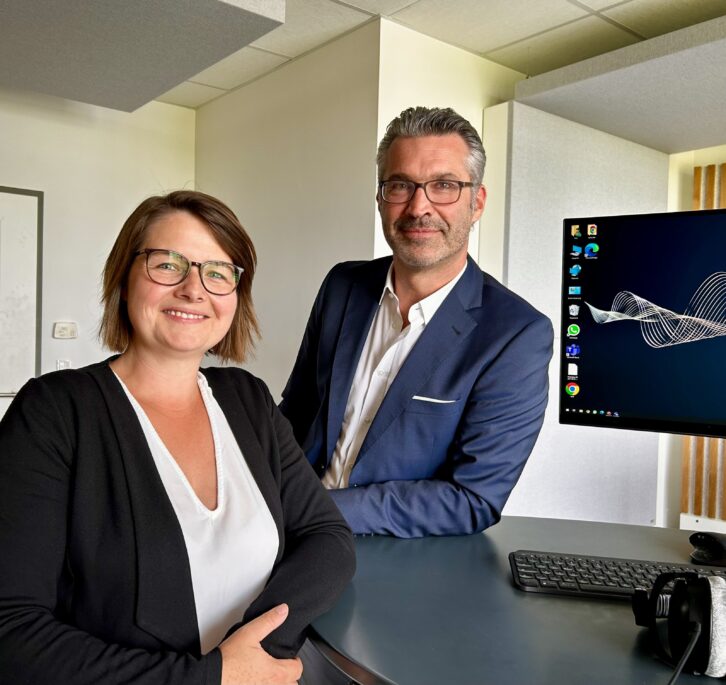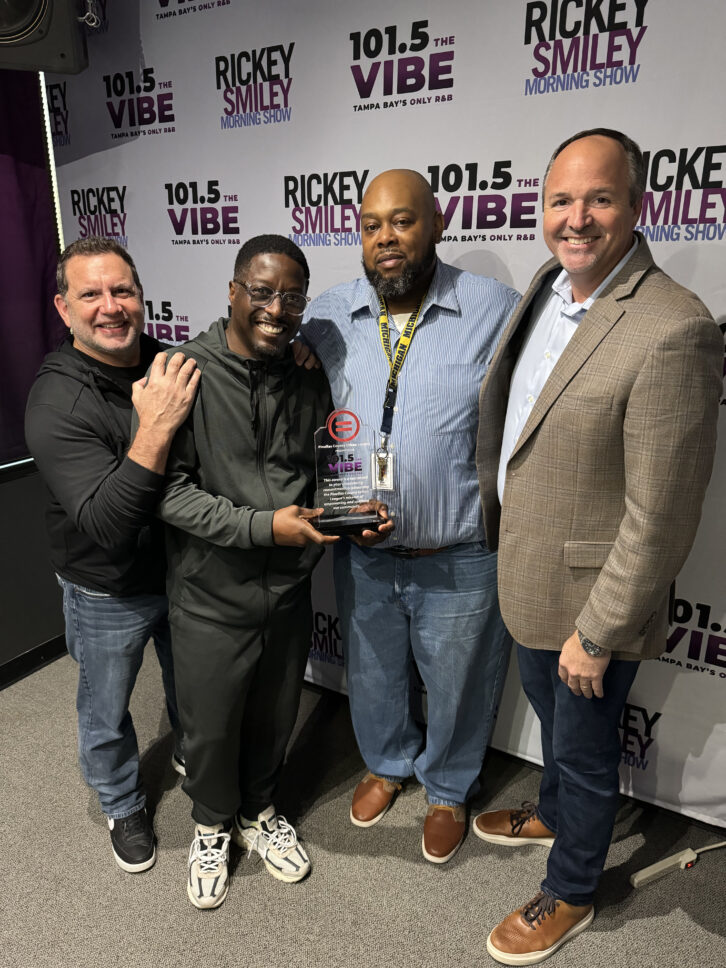Applications of generative artificial intelligence-based tools are spreading throughout radio while other types of AI are already well ensconced. In a recently released ebook, Radio World sought comments from a sampling of companies about how they’re deploying AI.
I’ve already shared the experience of four managers at NRG Media; you can read that here. Below are more case studies that shine a light on how AI is being used in our business.

Beasley Detroit
Patti Taylor is vice president and market manager at Beasley Media Group Detroit.
“Within our organization, we use AI tools for content creation on the programming side as well as for revenue generation on the sales side of the business,” she said.
“AI is used both in the pre-sale and post-sale phases of the sales cycle. In the pre-sale phase, AI can be used to write a compelling introductory email to a prospect. It can ingest language and tone that will appeal to the specific prospect receiving the email.”
An account executive can request an email written for the president of a chain of local hardware stores using a valid business reason based on current hardware trends as well as the prospects personality.
“You can even ask AI to write a strong subject line for this email. AI can then write a compelling audio script for the same hardware store to promote their huge sale on Craftsman tools over President’s Day weekend.”
Throughout the sales cycle, account executives can “delegate” to the AI tasks that, in the past, might have taken a long time to complete. “AI can make a sales rep’s workload lighter so they, in turn, can sell more,” she said.
Taylor said Beasley does not have a general policy about how AI will or will not be used.
“I feel like it won’t be very far away though, as we create more and more content and need to be more vigilant on the output. We have nearly as many content writers as we do on air talent these days, so being cautious when it comes to original content will be paramount.”
But she’s clear that both generative and predictive AI are changing the sales landscape in general.
“Generative AI has become the latest buzz as salespeople everywhere are discussing the benefits of using AI systems to lighten their workload and elevate their overall productivity. Generative AI can serve as sort of a creative arm or administrative assistant taking on tasks that otherwise may have bogged down a sales rep.”
She noted that cold calling is probably one area most account executives would say they dread the most, and it takes the most time.
“But it is absolutely necessary. A current training system we have utilizes AI to help account executive write a compelling email to a prospect, among other things.”
Like NRG described earlier, Beasley Detroit uses an AI tool that can create a video for a customer within a couple minutes by entering only a small bit of information.
“This tool is great in the post-sale so you don’t have to have costly videographers employed, but it also works extremely well in the pre-sale. Sellers on our team can spend less than five minutes and have a great-looking video produced that they can use to get an appointment with a prospect.”
As a result, sellers on her team can go on more calls per week and present more opportunities than they did in the past. “AI has honestly become a game-changer on the sales side of our business as more and more tasks get taken off a seller’s plate by AI,” Taylor said.
How widely will radio broadcasters deploy AI to replace live talent?
“As someone who has spent an entire career in broadcast radio sales,” said Patti Taylor, “I really hope we are not getting close to a time when AI will replace live on-air talent. One of the most valuable selling positions we have is ‘live and local.’ The on-air talent is part of radio’s appeal, in fact, it’s part of the agreement with the audience, and it’s one of the top responses to the question, ‘Why do you listen to the radio?’ Without talent, we lose a key component of the fabric of radio, live talent that lives and works in the market, just like the audience. AI cannot shake hands and kiss babies.”
Where she sees AI fitting in is with show prep, copy ideas, personality preparation and other time-saving tasks.
“Replacing a human being with AI does not compute to me, because humans still have to be responsible for some input in order to get output,” Taylor said.
“AI should be treated like any other software or business solution. We have to find out how AI can best support human-driven projects and initiatives, enhance productivity and eliminate lengthy timelines.”

Rome Radio Partners
“104.9 The Rebel” is FM station WRBF in Plainville, Ga., not far from Atlanta, licensed to Rome Radio Partners. It recently deployed an AI jock called A.I. Gunner on its overnight shift using the Futuri AudioAI system.
Majority Partner Howard Toole is impressed with the tool and its available choice of personalities. The platform gathers relevant content from certain approved websites and follow a series of prompts to populate scheduled breaks with synthetically voiced content while making sure a given topic or category doesn’t recur too often.
“It has its quirks. It does have pronunciation problems from time to time,” Toole said.
The station staff had to correct the AI’s pronunciation of “wind” when describing the weather. They taught it not to pronounce “The Rebel” as “The re-BELL” and to avoid certain difficult native American place names. And sometimes the inflection isn’t quite right.
“It really is a work in progress,” Toole said. “Futuri continues to refine it, and the only thing that will happen is it will get better.”
He marvels at the quality that Alpha Media has achieved with AI Ashley, the cloned radio personality that (who?) made headlines last year. “Somebody spent a great deal of time with that. But this is a learning process. While it learns, you’re going to be learning too. Then it’s about how you how you play with it and how you make it sound real.”
WRBF is also using a cloned voice for its promos and liners. The person who had been working in the traditional way as the voice of the station was amenable to an agreement under which WRBF would clone his voice and continue to pay him a retainer.
With that contract in hand, Toole uploaded about 70 minutes of the performer’s audio samples. He said the results are “pretty scary. I think even he was surprised at how much it sounded like him.” Those samples became the basis of new promos.
Eventually, Toole also plans to air phone calls in which AI-generated listeners interact with AI voice talent; these would be programmed in advance. He doesn’t feel it’s important to call attention to the use of AI on the air — “Does it really make any difference? Did it entertain someone?” — but he expects that the FCC eventually may require stations to air a message that some portions of a program were generated with AI. “That hasn’t reared its ugly head yet,” he said.
Where else might AI help a radio manager? Toole said Rome Radio has experimented with an AI-based tool in ReelWorld’s Production Vault radio imaging service. He said it is helpful in creating short promos that include AI-based listener comments. He also has seen demos of software that will create spec spots in minutes, though he isn’t using one at this point. And he hopes providers of radio traffic systems will deploy AI more widely so the workflow of scheduling radio commercials can become less hands-on.
In general he is enthusiastic about the possibilities.
“I was using text-to-speech programs 12 or 13 years ago so I’m not afraid of it. But I’m not looking to replace talent. As AI learns, people have to learn how it functions. If we were to look at medicine 100 years from now, people would say, ‘Man, medicine was so crude.’ I think that’s the same thing you can say for AI right now.”
Antenne Deutschland

Last year German broadcaster Antenne Deutschland launched a streaming station programmed with AI and voiced by a synthetic air talent named kAI. The channel, called Absolut Radio AI, uses technology from Radio.Cloud. Its cloud-native software creates a schedule, programs the breaks and creates voice tracks with a feature called Voicetrack.ai. The streamed station targets listeners ages 14 to 49 years with pop and dance music.
“kAI not only gets you through the day in a good mood,” its website promises. “He also has a lot to say. He gently introduces you to the topic of artificial intelligence and explains to you how versatile an AI can be used, how it works and where its limits are.”
Antenne Deutschland subsequently put the AI format on a local DAB+ channel in Braunschweig in north-central Germany. It’s believed to be the first over-the-air radio broadcast station programmed and voiced full-time with artificial intelligence.
Managing Director Mirko Drenger told Radio World last year, “For me, the headline is not that it replaces us. It makes us smarter and faster. It’s not about saving money. You still have to write program-specific prompts, develop your own logic and develop it further. It’s about creating more content, faster and smarter. It’s about fun and creativity.”
He said the company is also helping employees “skill up.”
“We encourage them to learn because more and more companies will require these skills. So we’re not just allowing AI; we really want them to learn it, which becomes a big advantage for us. … I don’t know what the future will bring, but we’re not replacing hosts; it’s an add-on.”
Radio World checked in with Drenger in February for this ebook to ask if there had been further developments.
“Our voices are improved, and we will launch a new, additional voice within the next weeks,” he said.
“We will start new topics in moderation to make the station more interesting and generating more and longer active sessions. The AI-Host kAI is already helping out on our other ‘normal’ stations if other hosts are ill or on holidays. This is very interesting.”
Lotus Broadcasting

“AI is not going away,” said Natalie Marsh, vice president/market manager of Lotus Broadcasting in Las Vegas.
“Quite the opposite. It is growing at an almost frightening pace. My viewpoint on things like AI is leaning into how they can help you. … I am going to focus on what I consider to be one of radio’s biggest attributes: connection to the local audience. So we are looking at how AI can help us streamline content creation,” she said.
“Can we use it to help us with more interactive features such as polls, quizzes or live chats? I am also looking at the abilities of AI to analyze listener behaviors and how we can utilize this to enhance their radio listening experience. We also want to figure out if there is an ethical way to use it to enhance engagement for our listeners without losing the human connection that is paramount to radio.”
But Marsh said Lotus is being very cautious in the AI world. “You have already seen the backlash on some industries that might have jumped in too quickly.”
Cox Media Tampa

The six-station Cox Media Group cluster in Tampa, Fla., has been using a cloud-based discovery tool from Veritone for some time.
It allows a salesperson or programmer to find instances of a word, advertiser or topic mentioned on the stations. The user can pull up a summary of how many times a client was mentioned, on which stations, including audio soundbites. This helps document the value being provided to a client beyond any commercials that are running.
“It allows us to take credit for what we actually do,” said Jason Meder, vice president and market manager. “And as a medium, I think it makes us stronger.”
More recently the cluster began using an attribution tool that helps create models of success for OTA schedules and digital advertising.
“We can match the two and show how our radio and terrestrial media affect search habits and digital advertising,” Meder said. Typically tied to an advertiser’s Google Analytics, the platform provides insight into how on-air content drives online activity — searches, social mentions, website activity — for the advertiser.
In general Meder takes a cautious mindset about new AI tools. “We just want to be extremely careful how we use it, so that there’s no negative impact on our business or reputational damage that could happen from sharing data that that shouldn’t be shared. It’s critical with AI or any new tool [to use it] in a strategic, safe and productive way.”
He said Cox has a taskforce that considers new tools and explores their implications before deployment.
“As the market manager I’m probably the probably the least tech-savvy guy in the building. We’ve got folks on the tech side, folks on the legal side. You put their brains on it and you end up with a with a pretty good decision-making team that can define the guardrails for the rest of us to operate it.”
The cluster has five music stations and one talk. It is not using AI-based clones or synthetic voices, though Meder has heard demos of products in the marketplace. “It’s really amazing how technology will allow these programs to not only do the voice work but go out and create the content from websites. And it’s hard to tell the difference from a real radio talent.”
He’s similarly impressed with tools that can take a business name and website and within a few minutes write and produce a radio-ready commercial. And he expects AI to have a significant impact in commercial production, thanks to its ability to create or clone thousands of voices.
Like most radio executives we’ve talked to, Meder says he would not use AI to replace people but to create efficiencies and workflow. He says radio must protect the human connection for which listeners tune in.
He would want the audience to know if an AI voice was being used. “Absolutely. I think the minute you lose the trust of your audience, you’ve lost everything. People tune in because they want live and local programming and because there’s somebody on the other end of that microphone whom they feel like they can identify with,” he said.
AI should be used to create workflow opportunities and make the product better. “But I don’t believe it can be used to replace people in our core, especially on the air.”
Media Solutions

Allard Ruyl is the CEO of Media Solutions, sales house of Talpa Network in the Netherlands. He told the website Marketing Report that he expects AI to bring significant benefits to the media industry.
“We are running multiple tests at the same time,” he said. “For example, we are currently in an operational phase in the field of audio, where we are already using advanced text-to-speech technology to create artificial voices for audio commercials.” Talpa is using software from Adthos for that project.
“In addition, we are also planning tests for video in the long term, where we want to apply similar technology. We are investigating how we can integrate this with dynamic advertising, just like with audio. The ultimate goal is to seamlessly align data and creative content, resulting in more effective and personalized campaigns.”
Talpa Network also has an AI Hub, which he said “continuously tests new apps and possibilities and thus keeps the company informed and inspired. And of course to see whether tools can be used safely.”
HIS Radio

AI tools including voice cloning have allowed HIS Radio to expand the amount of local content it airs on its regional network of stations.
HIS Radio is part of the Radio Training Network; it broadcasts adult contemporary Christian music on about 20 FM signals across nine markets in the Carolinas and Georgia.
“Since we’ve grown onto those sticks and into all those local markets, I wanted to deliver local content, even though the jocks and music are coming out of Greenville, S.C.,” said Rob Dempsey, station manager and morning show host.
“With this technology you can localize anything. So all the stops are localized, the weather is localized, we have three breaks an hour during the weekdays. And we’re expanding to the weekends now to deliver that local content.”
Using Futuri AudioAI, the organization cloned the voices of its main air talent, beginning last August. The clones populate three 18-second breaks per hour on each station with locally relevant information.
“I’ve made very clear to our team that this is never going to replace voice tracking or a live shift,” Dempsey said. “Talent is not going to be replaced by AI. However, we can enhance the workload and our local content using AI.”
He said that although the talent themselves can tell the difference between their own voices and the clones, listeners cannot. HIS Radio does not actively call attention to its use of AI, though Dempsey said he would not hide it from anyone who inquired. And if a talent leaves the organization later, HIS Radio has agreed it will not continue to use their voice.
“It’s absolutely amazing how the technology has grabbed the vocal print,” he said.
“You can give it a trait — friendly or humorous or charismatic, they’ve got a lot that you can pick from. They even have pitch and pacing, and you can make small adjustments. And while it’s not perfect, it’s getting the job done.”
The system uses prompts to create promos by pulling from relevant sources such as lists of Christian concerts scheduled in the area. “I have a prompt, ‘What’s going on that’s family-friendly in Horry County,’ which includes Myrtle Beach. It will search the family-friendly activities in that area and list two or three in an 18-second break.”
The software can vary the way that it delivers content in an “artful” way; it can be trained to avoid certain practices such as addressing listeners in the plural.
“I like my talent to speak to one person, not to an audience,” Dempsey said. “At first our AIs were saying ‘So, folks …’ but I can go in and ban that phrase. Also, now it can give the weather with more personality rather than in a statistical, matter-of-fact kind of way. And it will no longer refer to the weather ‘out there,’ which disconnects us from the listener; I can ban that phrase too.”
Dempsey notes that artificial intelligence tools are all around us already. “Alexa is AI, Siri is AI, and the way that we search on Google.” HIS Radio also uses AI to help in the ad-writing process.
“I can go to ChatGPT and say ‘Write me a 30-second radio spot for XYZ,’ and it will crank out a script for me. And AudioAI has a plugin called SpotOn where you can type in the website of an organization and it will write 30- or 60-second copy and produce it, with music. I have not seen a perfect radio copy come out, but it’s been good, and I can massage it.”
He calls AI a tool that is not a replacement for people.
“And you need to take the time to do it right. You need to tweak it, often, to make sure it’s doing exactly what you need to do. Don’t set it and forget it, because then it’s going to go weird on you.”

Mid-West Family
A.I. Liam Jones is the overnight talent on classic rock station WZOC(FM) in Plymouth, Ind., serving the South Bend area. His colleague A.I. Alley has the same shift on CHR station WQLQ(FM) an hour up the road in Benton Harbor, Mich.

Both have their own bios and photos on the station websites. Both are artificial intelligence DJs and are labeled as such.
“We think it’s important to identify that this is not real,” said Bill Gamble, general manager of Mid-West Family. “Have fun with it, embrace it. Let the audience in on the joke. Let them look for the mistakes.”
In an era when very few radio stations employ people in the studio at night, AI technology — in this case, Futuri AudioAI — can provide entertainment as well as updating a weather forecast.
“When stations are voice tracked or just playing ‘song-production piece-song,’ they can sound bland. This livens it up,” Gamble said.
“It’s not going to make or break us; it’s not going to be the best thing ever.” But the company is having fun with the concept.
“We had a proposal from a national advertiser looking for endorsements, and we submitted all of our talent. We also submitted the AI talent. They didn’t pick the AI talent but they got a kick out of it.”
Gamble finds it fascinating that he can type just three or four words or tell the AI to talk about a topic, and the technology complies. However, he thinks it is in scriptwriting and production where AI is likely to have a bigger impact.
“At every radio station I’ve ever worked at, you could tell the size of the staff by the number of voices you hear on the commercials, especially when you hear the morning guy back to back,” he said.
“Using AI voices, we don’t have that. It’s not like the voices are going to read a great 60-second spot — they can, but it requires a fair amount of work, finessing and tweaking — but let’s say you’ve got a lot of Home Depot tags and 30 spots that rotate. You’re going to need to do 30 different tags. Having an AI voice helps make the station sound better because it’s not just the DJs you’re hearing.”
Similarly, it becomes very easy to produce station promos when you can simply enter several basic pieces of information and a tool will generate a 30-second script, which either you or the AI can voice.
“Some of the tedious tasks of radio production are being done by AI quicker. Anyone who has been a production director at a radio station has spent their whole day in a room with no windows, cranking out commercials and promos. If I don’t have a second voice or the resources to write six scripts for a car dealer, let AI do it.”
In virtually any radio job, he said, what most people need is more time. “If I can automate a task, like writing a 30-second spot or recording promos — boilerplate work — it gives me time to do more creative work.”
He understands why voice talent would find AI frightening. “If I’m Budweiser and I’m paying someone hundreds of thousands of dollars a year to voice my commercials, and I can have AI do it, it’d be pretty tempting.”
More broadly he acknowledges being unsettled by the proliferation of fake content in our culture.
“It used to be that you could believe what you saw or heard. But when you see a picture of a bombing, and then realize later it wasn’t a real picture, you wonder what is real. That’s why we decided that if we’re going to have any AI talent on the air, we’re going to say so, it’s going to be in their name and on the website.”
Meanwhile, experimenting with the technology gives the company more options. And Gamble adds that it’s just plain fun to play around with.
“I can tweak the pitch of the voice, I can increase the tempo, I want the accent to be like this. And it keeps getting better and better,” he said.
“But in the end, it’s a sauce to the steak. It’s not the steak.”
[Read More Radio World Stories About Artificial Intelligence]







